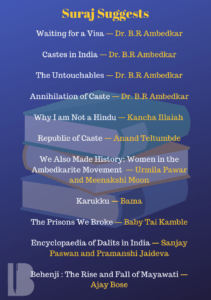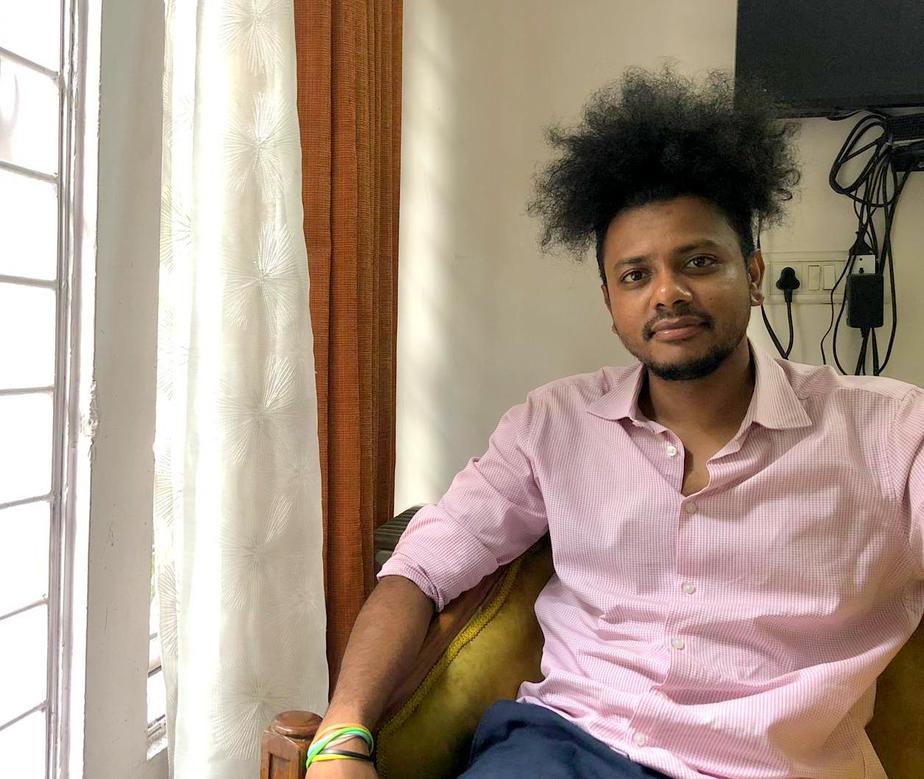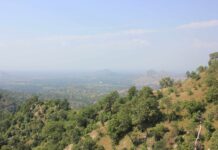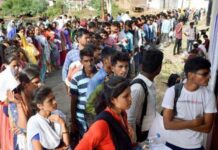Suraj Yengde (SY) studied law in Nanded, Maharashtra. After spending a brief period of time at the University of Mumbai, he went on to complete his LL.M. in Birmingham, UK. He worked with the UN in Geneva after which he completed his PhD in South Africa. Currently, he is a postdoc at the Harvard Kennedy School, where he is working on a project called the Initiative for Institutional Anti Racism and Accountability. He was recently in India to launch his book Caste Matters (you can purchase a copy here). He is probably the first youngest Dalit scholar to be published by a mainstream publication after Ambedkar and spoke to Evita Rodrigues (ER) about his journey and experiences with caste, and his thoughts on building an inclusive education system in India.
ER: What was education in India like for you? How accommodative did you find educational spaces?
SY: I grew up in a small town called Nanded in Maharashtra where I went to an English Medium school. Back then, I was the only one from that slum to go to an English medium school. My father was an Ambedkarite and was devoted to the struggle. He couldn’t study beyond 9th grade but made a conscious decision to make his children learn English. He was a chaprasi (peon) - people often asked, “Chaprasi ke bete ko English Medium me pada rahe ho?”(A chaprasi’s son is studying in an English Medium school?)’.
I later realised my friends would seldom hang out with me after school hours. I didn’t even know there was a thing called after school hours where you meet up for recreational purposes. My friends had their own cliques, dominant castes mostly. I remember one boy from my class hurling epithets at me describing me in public,“Ye Suraj, usko jaha khana milta vaha chale jata hai” (This Suraj, he will go wherever he can get food) That was really hurtful for me, I remember feeling so anguished back then. Food was a notion of superiority upon which they could establish their upper-ness.
It was not a school for Dalits, it was a missionary school for rich people. Thankfully, I had three Dalits in my class and we sort of got each other’s backs. I don’t remember any Dalit teachers in school. There were two teachers who really took care of me and mentored me, the others were really contemptible. I didn’t realise then that they were Brahmins or dominant caste casteists.
ER: Did this change when you moved abroad for higher studies?
SY: Learning is a collective process, it’s not an individual achievement - and that’s what we miss here. The Indian education system believes in merit that is not there. We believe in competition, which shouldn’t be there. Abroad, collective learning is a key component through projects and teamwork. There’s so much emphasis on interaction and conversation, that accommodation is natural.
Education abroad is also quite liberal; they critique their history, they talk about racism, the horrors of slavery. Where do we study the horrors of untouchability in India? Kids are not exposed to that - that’s why we bring up sentiment-less, emotionless, senseless young students because they have not been exposed to others’ struggles. Such privileged students go on to occupy important positions and then they reproduce the same because they haven’t been exposed to any other experience.
Let’s understand caste so we can tackle it !
Those in #Hyderabad#Ambedkar pic.twitter.com/fvd6HbKjpK
— suraj yengde (@surajyengde) September 20, 2018
We need to liberalise our education, educate students on everything from gender to caste, only then will we be accommodative in a true sense.
I grew up in a Dalit slum, always knowing what my caste was. But a lot of my mature understanding of caste happened abroad and that’s why I could write this book. I studied in four different continents, and the exposure led me to look at issues not necessarily through one lens only. I attempted to look at things from different perspectives but from a constant lived reality. The urgency before me now is that my people are suffering now. I have the space and cultural capital now, whatever little I have, and I better use it to talk about things that affect the most marginalised and vulnerable and that includes Dalits.
ER: The Print recently carried an article on students from SC, ST and OBC categories dropping out from IIT, especially at the undergraduate level. This was linked to caste discrimination and the absence of a level playing field. How do you look at this dropping out as a systemic issue?
SY: The system neutralises the overt feudal caste system — it remains feudal, sexist, patriarchal, casteist and homophobic in its make up. The system that has failed these students, is actually a casteist institution hiding under the guise of system.
I think we ought to be honest in appreciating the efforts of SC, ST & OBC students to be on campus. We need to ask why there are less SC/ST/OBC professors in educational institutions. We cannot reduce the issue down to language - language is not reflective of quality, it can be taught. What we need is devoted people - these Dalit or Adivasi students have devoted their time to learn and that’s why they are there.
Whoever gets into college, irrespective of their caste, should have a foundation course on anti-casteism, how caste operates, and what untouchability is. In addition to this, there needs to be mediated process, where the institution along with the faculty and student bodies make sure that Dalit students are taken care of mentally and physically. Remedial coaching is one thing which is already happening. We need Anti-Caste summer schools, where savarna students and Dalit and Adivasi students can come together with the idea of celebrating something, but also to talk about their cultures, the history behind it - we need to have that important conversation. We can’t impose culture, because when you do that you colonise the person, but we can and need to have the conversation.
ER: The draft NEP made several recommendations regarding the incorporation of Vedic educational treatises into school curricula - how does this impact education in India? How can we make curricula more inclusive and accommodative?
SY: I haven’t been following the NEP in detail, so I’m limited in my response to it. However, this move seems to be anti-scientific and anti-constitutional. The Indian Constitution encourages promotion of scientific temper and rationality. It could be part of a course, an optional segment, but not the main thing. The idea is also welcome as much as I will bring my idea of Buddhism and other forms of protest. But what this Government is trying to do is make people more intellectually incapable, more intellectually dwarfed. There is also something to be said about the Education Ministry led by people without proper credentials. We’re always questioning Dalit credentials, why not ask where their degrees are now? They shrug and say this is politics then what the f**k, why don’t you apply this logic to Dalits?
Take a chill! Rest back and listen in the earphones or on the loudspeaker!
Peace ? https://t.co/4wNQXEVza2— suraj yengde (@surajyengde) August 14, 2019
As far as I can see, this seems to be an effort to Hindu-ise learning. There is a significant influence on a child’s mind, especially because of how integral textbook rote-earning is to the Indian education system. The quality of content provided in textbooks is already abysmally low, and then the insertion of these Vedic contents goes on to tell children, and the world how supreme Hindus were, and by that, you mean how supreme Brahmins were.
ER: While most of the conversation on caste and education revolves around reservations, the recent tragic death of Payal Tadvi reminds us that reservation by itself is not sufficient, and there are structural barriers that make educational spaces inaccessible even after entry.
Could you elaborate on what kinds of institutional mechanisms are required to make educational experiences in India safer, and more accountable to caste violence?
We need an Anti-Caste Discrimination Cell in every university. We need a specific officer to oversee mental health and academic development of the student. There needs to be nurturing and proper care where students are provided a safe space to share their problems. These facilities exist abroad, so why not in India? In America, there are diversity officers for Black students or people of colour, and there is also a lot of emphasis on mental counselling. Dalit students need to be helped, but oppressors need to be educated as well. Screen films to sensitise students on caste, bring Dalit activists and scholars to talk to students to tell them what it really means to be a Dalit. We need to make adequate investments to end Dalit stereotypes.
Payal Tadvi’s oppression was normalised, we can’t afford to do that. We need institutions to be more accountable, we need more Dalit professors and Dalit teachers in colleges and schools. We need to encourage Dalit culture on campus, we need to educate people about it, we need to have Dalit History Months, Dalit Social Months and every other month that will celebrate Dalit identity and not denigrate it.
It is important to equip and accommodate marginalized students but without trying to change their identity, why can’t we let them grow the way they are? Today I can say that I’m a proud beneficiary of reservations. But most students who come on reservation can’t own themselves up, they are shy & afraid, and have to deal with so many unfair questions - look at what Payal Tadvi had to undergo. It’s a shame that we lost an amazing doctor ( Tadvi) to discrimination. As a woman coming from a backward region, she was the best prototype to tell the world that we are also progressive - but her death has shown us that we really are not.
ER: What do you think HEIs should be doing to make spaces more accommodative? What are the structural changes you would suggest?
Providing access and opportunity for education in English is very important. We can have second languages in a tri-language system, but everyone should get equal access to learn English. The English language receives importance across the globe, and if we want to empower marginalised students to take on the world, we must equip them with fluency in English. Try asking a rich savarna to send his child to a Hindi Medium or Marathi medium school - he will think you are crazy. Even pandits who have careers in Sanskrit, still give their children an English medium education. English helped me go places - where do I take Marathi, to Harvard? If I hadn’t studied in an English medium school, I wouldn’t have been there. We’re having this conversation simply because we both speak English.
Read More: Should the NEP Prescribe a Three-Language Policy With Hindi?
Reservation is just one step, there are more steps that we need to take. We need to think beyond what is in front of us, there are many layers to students that have come from various backgrounds. You don’t need to have a charitable attitude but a generous, deserving humanist approach to understanding people. For that institutions have to have proper accountability mechanism so that they are made to feel more secure.
ER: If, as you say, the current democratic system is a feudal one in disguise, how can sites of oppression be better identified?
SY: Everyday Dalit men are killed, Dalit women are raped - caste is a pessimistic institution. Yet Dalits live in optimism and that is powerful. We now have to equate the relation of caste with modernity. We can go about defending and criticising caste as much as we want but in addition we have to think that if caste is of a bygone era, how do you make sense of it current times? Modernity has co-opted many of the casteist norms.
I encourage young people especially to read —

Read Dhrubo Jyoti’s writing on his experiences, Sukhdeo Thorat’s work on Dalit political science, economics and reservations, Amit Thorat’s work on untouchability in metropolitan cities, Satish Deshpande on how castelessness is a fake idea, Dalit literature by Braj Ranjan Mani, work of Carmel Christy, Vivek Kumar and Y.S Alone. These are all great individuals who’ve put out great work that needs to be read and assimilated urgently and by everyone, especially young people. As a starter also follow on Youtube some BAMCEF related conventions and videos by Kanshiram, Waman Meshram, and other organic intellectuals of the community.
Views expressed are personal.






